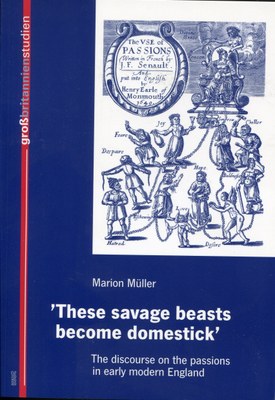'These savage beasts become domestick' The discourse of the passions in early modern England

The aim of this book is to examine the perception of the passions in non-fictional, early modern English texts. Its corpus is divided into two main groups: rhetorical textbooks and tracts and treatises about the passions. The book shows that in sixteenth-century rhetorics there was an emerging awareness of the passions not only as literary tools but also as extra-literary phenomena existing in the world beyond the page (Chapter 1). In the seventeenth century the passions achieved a growing emancipation from rhetoric and were increasingly viewed as objects of study in their own right. Through the analysis of texts about the passions by Thomas Wright (Chapter 2), Benet of Canfield (Chapter 3), Jean François Senault (Chapter 4), Edward Reynolds (Chapter 5) and Walter Charleton (Chapter 6), the book illustrates various characteristics of the discourse on the passions in the early modern period. It demonstrates that, despite the writers’ awareness that the passions account for unsettling ambiguities in the human person – that “piece of work,” in Hamlet’s words, which is both “beauty of the world” and “quintessence of dust” (II.ii.307, 308) – they all exhibit a readiness to find value, or potential value in the passions. Moreover, an exploration of the marriage between faith and reason offers an explanation as to why this might be so. For the book claims that, according to the seventeenth-century authors under consideration, one passion in particular – amor Dei – is the alpha and omega of “emotional intelligence.” It furthermore shows that the desire to understand the passions is indissolubly linked with the quest for the self. Examining the relationship between the texts and the individual’s interiority, the book argues that the treatises function as rhetorics of inwardness and proving grounds for investigating the self.
Marion Müller. 'These savage beasts become domestick' The discourse of the passions in early modern England. 2004. Trier: Wissenschaftlicher Verlag.
